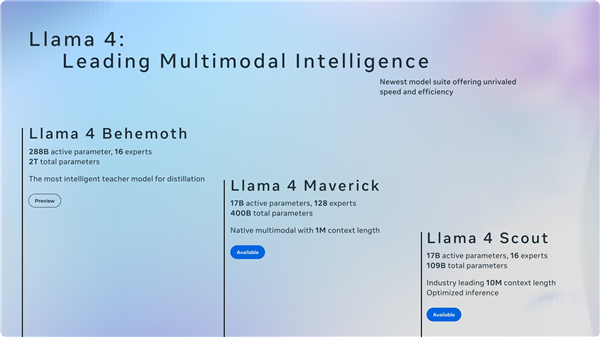Meta, the American tech giant, has announced the launch of its most advanced open-source artificial intelligence (AI) model, Llama 4, on Saturday, April 5. This new model comes in two versions, known as Scout and Maverick.
According to Meta, Llama 4 is a multimodal large model capable of processing and integrating various types of data, including text, video, images, and audio, and can convert content between these formats. This series is the first to employ a mixture of experts (MoE) architecture, which enhances efficiency in training and responding to user queries by segmenting the model into several “expert” sub-models that focus on specific tasks.
Meta claims that Scout and Maverick are not only the company’s “most advanced models to date,” but they are also “state-of-the-art in the multimodal space.” Scout features 17 billion active parameters and operates with 16 expert models, summing up to a total of 109 billion parameters, while Maverick also has 17 billion active parameters but utilizes 128 expert models, bringing its total parameter count to an impressive 400 billion.
Additionally, Meta is currently training an even more powerful model named Behemoth, which it describes as one of the smartest large models in existence and refers to it as the “teacher among new models.” All these models have been trained on “a massive amount of unlabelled text, images, and video data” to ensure a broad understanding of visual contexts.
Both the Scout and Maverick models are available for public access on Llama.com, as well as through partners of Meta, and can also be accessed via WhatsApp, Messenger, and Instagram Direct.
Meta announced that its AI assistant, Meta AI, has been updated to utilize the Llama 4 model in 40 countries, although the multimodal features are currently only available in the United States and in English.
CEO Mark Zuckerberg spoke at the launch, stating, “Our goal is to build world-leading AI, make it open source, and make it widely accessible so everyone in the world can benefit.” He emphasized his longstanding belief that open-source AI would become the leading model, adding, “With the release of Llama 4, this is beginning to happen. Meta AI has received a significant upgrade today.”
Chris Cox, Meta’s Chief Product Officer, noted last month that the launch of Llama 4 would empower AI agents to become more capable, enhancing their reasoning and action abilities.
Sources indicate that the release of Llama 4 was delayed for a year due to technical benchmarks not meeting Meta’s expectations, particularly in the areas of reasoning and mathematical tasks. The company also expressed concerns that its model does not perform as well as those developed by OpenAI when it comes to simulating human-like conversations.
Meta plans to invest up to $65 billion this year to expand its AI infrastructure, but investors are pressuring major tech companies to demonstrate tangible returns on those investments.





